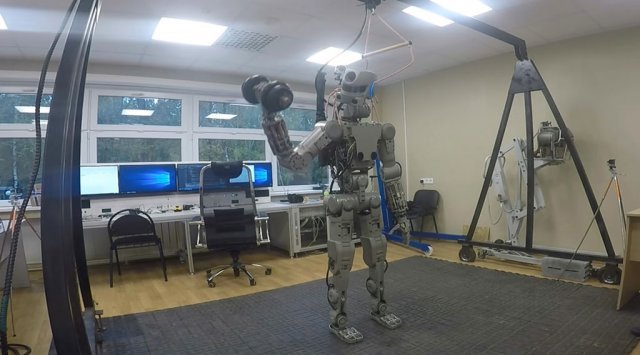These are the first images of the prototype humanoid robot Vladimir Putin hopes will conquer the moon for Russia.
The 'cyber cosmonaut' will be sent to the International Space Station ahead of tackling more ambitious tasks on the lunar landscape.
Pictures show the robot walking, lifting heavy weights, using power tools, performing press-ups and even driving with Russian experts hoping it will one day be able to help build a base on the moon.
Putin's deputy premier Dmitry Rogozin said: 'This thing can work without a space suit, live not only in a crew vehicle, but even outside it. Its name is Fedor.'
He claimed the war in Syria had shown Russia the importance of robots in difficult environments, and promised Fedor would make its space debut in five years.
Putin has also instructed his space chiefs to make a first landing on the moon within 15 years.
A key task for Fedor will be to 'assist in construction and use of bases' on the moon and potentially other planets, said its Russian designers FPI.
The robot can 'crawl, stand up after falling down, take and leave driver's seat in a car, use tools and operate in a regular building'.
Fedor stands 6ft tall, weighs between 106-160 kg depending on extra equipment, and can lift up to 20 kg of cargo.
'During space walking missions and on other planets, astronauts will rely on robots,' said Sergei Khurs, head of the project and director of the National Centre for Technology Development and Basic Robotics.
'Their capabilities are equal to those of humans, and in some ways even exceed them.'
Vladimir Solntsev, general director of Russian rocket-making corporation Energia, said: 'Our involvement in the Fedor-based space robot project will bring us to the next level in the development of robotic technologies.'
Alexander Grebenshchikov, director of the TSNIImash laboratory of space robotics, said: 'Every hour of work of cosmonauts on space walks costs from $2 million to $4 million (USD). '
'The use of robots for routine operations in the future will also spare additional time of the crew for leisure or for the fulfillment of other important tasks.'
新闻来源: tingclass.net
回去

